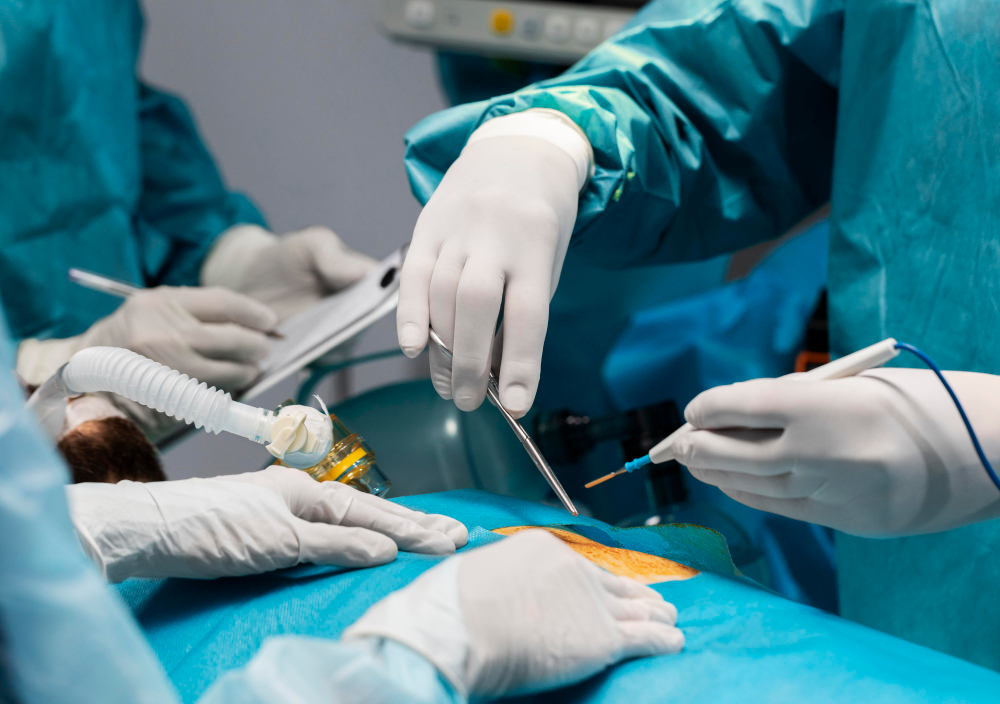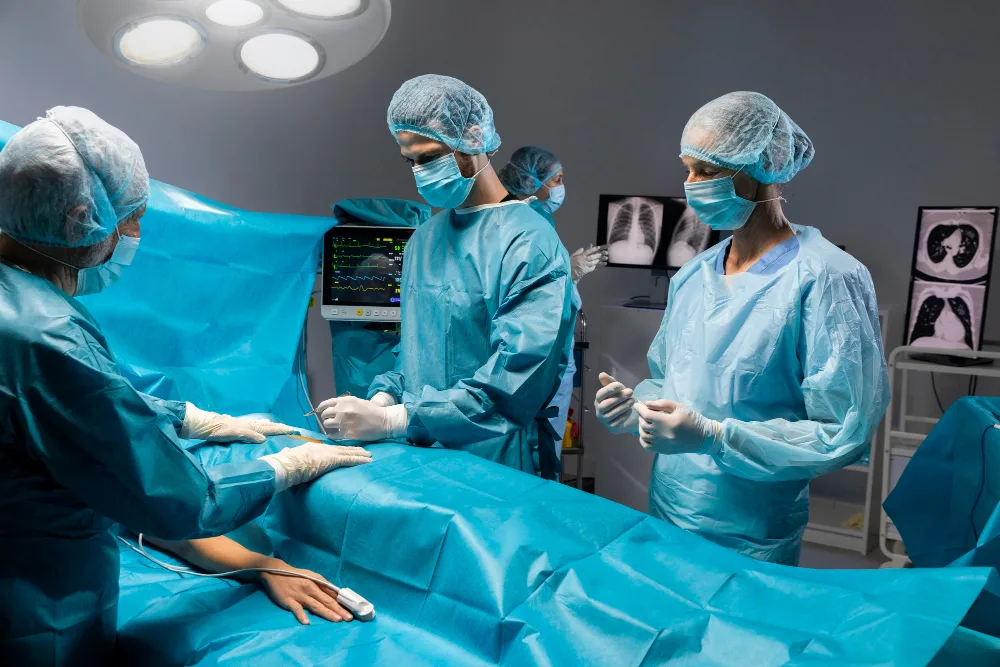Is Laparoscopic Surgery a Major Surgery?
Category: General Surgery
Laparoscopic surgery, also called minimally invasive surgery, has transformed the way major operations are performed. Unlike traditional open surgery, it requires only small incisions and the use of a camera-guided approach, resulting in faster recovery, less pain, and minimal scarring. However, many patients wonder whether laparoscopic surgery is considered a “major surgery” or a minor procedure.
At Lokmanya Hospital, patients receive clarity, care, and expert guidance before undergoing any procedure. With specialized expertise in laparoscopic gallbladder surgery, appendix laparoscopic surgery, ovarian cyst laparoscopic surgery, and other advanced techniques, Lokmanya Hospital ensures that even when laparoscopic procedures are categorized as major, they remain safe and effective for patients.
Is Laparoscopic Surgery Considered a Major Surgery?
The classification of laparoscopic surgery depends on the condition being treated and the complexity of the procedure.
- Some laparoscopic procedures, like appendix removal or ovarian cyst removal, are considered relatively less complex.
- Others, such as laparoscopic hysterectomy surgery or laparoscopic surgery for uterus conditions, are regarded as major surgeries because they involve larger organs or longer operating times.
- Laparoscopic gallbladder surgery falls somewhere in between: it is very common and safe but still classified as a major surgery because it involves organ removal.
- So while laparoscopic techniques make surgeries less invasive, the seriousness of the procedure depends on the medical condition being treated.
Key Factors That Define Major Surgery in Laparoscopy
Several factors determine whether a laparoscopic surgery is considered “major.”
- Organ Involved
The organ being operated on largely determines whether a laparoscopic surgery is considered major. If the procedure targets a small or less critical area, it is often classified as minor. However, when the surgery involves removing or treating vital organs such as the gallbladder, uterus, or portions of the bowel, it becomes a major procedure. These organs play essential roles in digestion, reproduction, or metabolism, so operating on them requires specialized skill and carries greater risks, making the surgery more significant in terms of its impact on the body.
- Duration of Surgery
The time taken to complete the procedure is another factor. Short laparoscopic surgeries may last less than an hour and are generally less intensive. On the other hand, operations that extend for several hours, such as a laparoscopic hysterectomy or bowel resection, are more complex and involve greater precision. Longer surgeries also increase the physical demands on the patient and the potential for complications, which is why such procedures are considered major.
- Post-Operative Recovery
Recovery after surgery is a key measure of its seriousness. While some laparoscopic procedures allow patients to return home quickly and resume normal activities within days, major surgeries often require extended recovery. Patients may need to stay in the hospital for several days, follow strict dietary guidelines, and gradually ease into regular activities. Follow-up visits are also more frequent in major surgeries to monitor healing and prevent complications, highlighting the more significant recovery process involved.
- Risk of Complications
The risk level associated with a surgery also defines its classification. Minor laparoscopic procedures have relatively low risks, but major surgeries can carry higher chances of complications such as excessive bleeding, infection, or injury to nearby organs. These risks are carefully managed by the surgical team, but their potential seriousness places such procedures under the category of major surgery.
- Anesthesia
The type of anesthesia used is another defining factor. Most laparoscopic surgeries are performed under general anesthesia, which ensures the patient is fully unconscious and pain-free during the operation. While safe, general anesthesia itself carries risks such as allergic reactions or breathing difficulties. Since this level of anesthesia is typically reserved for more complex and invasive procedures, it adds to the classification of laparoscopic surgeries as major when used.
Benefits of Laparoscopic Major Surgery
Even when laparoscopic surgery is classified as major, it offers multiple advantages over open procedures.
- Smaller Incisions
Unlike traditional open surgery, laparoscopic procedures are done through small keyhole incisions. This reduces trauma to the body, minimizes blood loss, and leaves only tiny scars. Patients often find this less intimidating and more comfortable cosmetically compared to a large surgical cut.
- Faster Recovery
Because laparoscopic surgery is less invasive, patients recover more quickly. Hospital stays are shorter, and most people return to work or daily life much faster than they would after open surgery. This makes it a preferred choice for many patients who want effective treatment with minimal disruption to their routine.
- Lower Risk of Infection
With smaller incisions and less exposure of internal tissues, the chances of post-operative infections are significantly reduced. This is a major advantage because infections can complicate healing and prolong hospital stays. Laparoscopic methods protect the patient by limiting exposure.
- Less Pain
Patients undergoing laparoscopic surgery usually experience less pain both during recovery and afterward. This is because there is minimal damage to muscles and tissues. Less pain means a smoother healing process and a reduced need for strong pain medications.
- Cosmetic Benefits
Since only small incisions are made, the scars are almost invisible once healed. For many patients, especially younger individuals or women, the cosmetic outcome is a big relief, allowing them to undergo necessary surgery without worrying about long-term visible marks.
Why Choose Lokmanya Hospital for Laparoscopic Surgery
At Lokmanya Hospital, patients benefit from advanced facilities and expert surgeons skilled in both general and laparoscopic surgeries. Whether it’s fibroids laparoscopic surgery, laparoscopic surgery for PCOS, or laparoscopic hernia repair, every procedure is performed with the highest safety standards.
The hospital also provides holistic post-surgery support, including pain management, recovery monitoring, and guidance on precautions after laparoscopic surgery. With years of expertise and patient-focused care, Lokmanya Hospital is recognized as one of the leading centers for laparoscopic surgery in Pune.
Conclusion
Laparoscopic surgery may be minimally invasive, but depending on the condition, it can still be classified as a major surgery. Removing organs like the gallbladder or uterus, or treating conditions such as fibroids or PCOS, requires expertise, anesthesia, and careful recovery.
At Lokmanya Hospital, patients are assured of safe, effective, and advanced laparoscopic treatment, supported by expert surgeons and state-of-the-art facilities. The hospital’s patient-first approach makes it a trusted destination for laparoscopic surgery in Pune.
FAQs
1.Is laparoscopic surgery a major or minor surgery?
It depends on the procedure. Gallbladder and hysterectomy laparoscopic surgeries are major, while simple diagnostic procedures may be minor.
2. Is laparoscopic gallbladder surgery major surgery?
Yes, gallbladder removal is considered a major surgery, though it is commonly performed with minimal risks.
3. Is appendix laparoscopic surgery major surgery?
Appendix removal is usually considered a moderate procedure, but it may be classified as major if complications are present.
4. What is the recovery time for major laparoscopic surgery?
Most patients recover in 1–2 weeks for smaller procedures, while major ones like hysterectomy may take 4–6 weeks.
5. Is laparoscopic surgery safe for uterus conditions?
Yes, laparoscopic surgery for uterus problems, including fibroids and hysterectomy, is safe when performed by experienced surgeons.
6. What is laparoscopic surgery for PCOS?
It involves treating ovarian cysts and related conditions through minimally invasive techniques to improve fertility.
7. What is the laparoscopic surgery cost in Pune?
The cost varies by procedure and complexity. Lokmanya Hospital offers affordable and transparent packages.
8. What is the laparoscopic hernia surgery cost?
It depends on the type of hernia and its severity, but laparoscopic repair is generally cost-effective and safe.
Previous blog

Why is Laparoscopic Surgery Done?
Next blog






